April 1 to April 7
Ever wonder where the “new” in “New Taiwan dollars” comes from? That is one of the lasting legacies of Yen Chia-kan (嚴家淦), then-finance director of the Taiwan Provincial Government who was in charge of replacing the old Taiwan Dollar in June 1949.
While Yen is known as the “father of the New Taiwan dollar,” he enjoyed a long and successful political career, moving up to minister of economic affairs, minister of finance, provincial governor, premier, vice president and finally taking over as president upon Chiang Kai-shek’s (蔣介石) death on April 5, 1975. Serving three years before Chiang Kai-shek’s son Chiang Ching-kuo (蔣經國) took over, Yen is an often forgotten break in the 39 years that the Chiang family ruled over Taiwan.
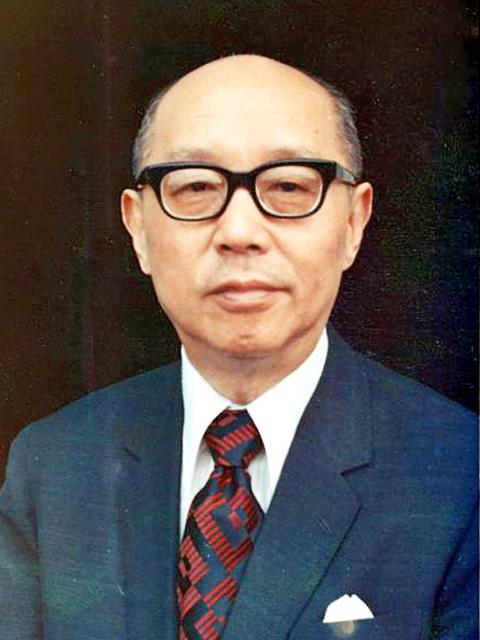
Photo courtesy of Wikimedia Commons
Due to his low-key personality and aversion to political maneuvering and factionalism, and because the younger Chiang still served as both premier and Chinese Nationalist Party (KMT) chairman, Yen is sometimes painted as a lame duck president while Chiang had the real power. But a weak person doesn’t manage to remain active and successful in politics for so many years, and he must have accepted his place in the KMT’s authoritarian regime.
His reputation was known internationally, with The Asia Magazine praising him in a 1966 article, “New man to watch in Taipei,” calling him a “brilliant economist-financier responsible for [Taiwan’s] fast growth in recent years.”
Yen’s son, Yen Chuan-tai (嚴雋泰) suggests in an oral history published by Academia Historica that Chiang Kai-shek likely did not intend for Yen to become president.
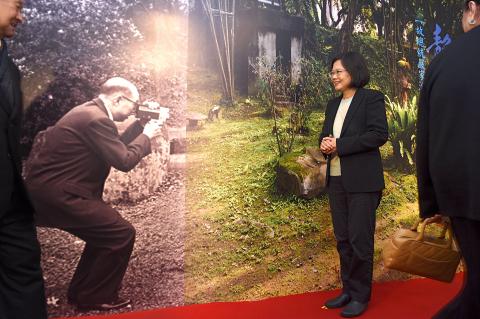
Photo: Tsung Chang-chin, Taipei Times
“I think that Chiang Kai-shek promoted my father to vice president for his contributions to Taiwan’s economic development,” Yen Chuan-tai writes. “Chiang knew that given Taiwan’s situation, the only viable path forward was to focus on the economy. So he found an economic expert to be his right hand man. Although Chiang was already 83 then, he believed that he was in good health.”
In the same book, former Central Daily News publisher Chu Sung-chiu (楚崧秋) recalls Yen saying that he would only take on tasks that he could accomplish.
“When he took over the presidency, his one worry was that he had no military experience. During those years, we needed a leader who could react to any changes in the tense cross-strait standoff. Yen believed that Chiang Ching-kuo was more experienced in this area and had long decided to cede the position to him once his term was over.”
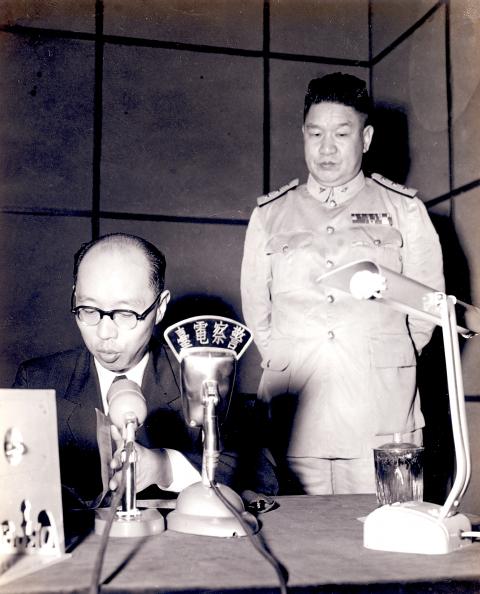
Photo courtesy of Wikimedia Commons
OUT WITH THE OLD
Born into a wealthy family, Yen started his career in public office in 1931 when he was still in China, taking a managing position in the Shanghai railway administration. By 1938, he had risen to finance director of Fujian Province. He arrived in Taiwan in October 1945 as director of transportation for the Taiwan Provincial Administrative Executive Office, later heading up the department of finance. Yen had no ties to Taiwan, but he was likely appointed because of his relationship with Taiwan Governor-General Chen Yi (陳儀), who had been the governor of Fujian prior to arrival in Taiwan.
Yen noted the state of Taiwan post World War II, with its many destroyed buildings and ruined infrastructure.
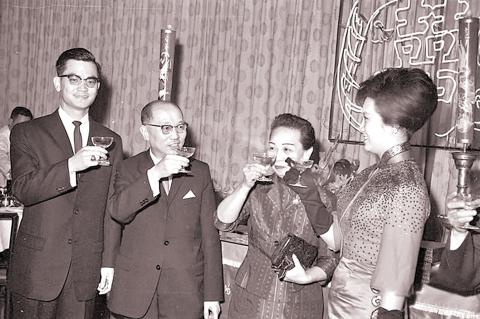
Photo courtesy of Wikimedia Commons
The Taiwan dollar was first issued in May 1946. But the Chinese Civil War soon led to massive inflation of goods, and the highest denomination banknote went from $10 in the beginning to $1,000,000 in just three years. There had already been inflation at the end of Japanese rule due to the war, but this sped up quickly under KMT rule. According to a paper by National Taiwan University economics professor Wu Tsung-min (吳聰敏), the wholesale price index for goods in Taiwan rose by a factor of 218,455.7 between 1945 and 1950.
“The price of goods in Taiwan is lower than other provinces in China, while its currency is higher. I want to maintain the value of Taiwan’s currency so that it’s not affected by inflation in the [currency used in China],” Chen Yi said.
However, funds from Taiwan were still funneled to support the war effort in China as well as its goods shipped off to the frontlines at low prices. Hyperinflation as well as currency adjustments in China also affected the Taiwan dollar. This extreme inflation, coupled with rice shortages, is one of the indirect causes of the 228 Incident in 1947, an anti-government uprising and subsequent violent crackdown. By the time Chen Cheng (陳誠) took over as provincial governor in January 1949, something had to be done.
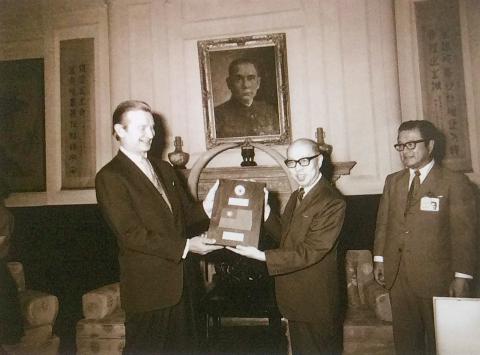
Photo courtesy of Wikimedia Commons
Chen entrusted the task to Yen, who was also the chairman of the Bank of Taiwan. He was adamant that a new currency was needed — one that was completely independent from that of China. Chen flew to Hangzhou to convince Chiang Kai-shek, who agreed to the plan.
In June 1949, the Bank of Taiwan officially started issuing the New Taiwan dollar at a 40,000 to 1 ratio, while NT$5 equaled US$1. People had until the end of the year to exchange their bank notes. He also imported 10,000 tonnes of rice from Southeast Asia to stabilize the economy.
Wu writes that while Yen’s efforts stabilized the price of goods, Taiwan’s financial situation was still in the red. It wasn’t until after the Korean War broke out in June 1950 and US aid started coming in, that the problem was finally resolved.
BRIEF REIGN
During Yen’s brief time as president, Taiwan’s diplomatic situation was looking grim. The economy, however, was taking off, with much of it often credited to Yen’s policies as finance minister, which resulted in a glowing endorsement in 2005 by then-president Chen Shui-bian (陳水扁) on Yen’s 100th birthday. Chiang Ching-kuo had launched the “Ten Major Infrastructure Projects” (十大建設) in 1974, and the nation’s economy grew by over 13 percent in 1976.
In May last year, Academia Historica made public a collection of archives related to Yen. Among these are detailed blueprints from a missile development project codenamed the “Chang An Plan” (長安計畫), with the aim of designing, manufacturing and testing missiles for defensive purposes. The plan was drafted in June 1975 during Yen’s administration and was only declassified by the military in July 2017.
“The main purpose is to be able to drive away invading forces in the defense of Taiwan, Penghu, Kinmen and Matsu,” the document states.
It alludes to Taiwan’s plummeting international status.
“[D]ue to our diplomatic situation, there are many components to the defensive system that we will be unable to acquire from overseas. There are three ways to get around this: to import a portion of the parts and develop the rest on our own; to import a civilian system and convert it to military grade on our own; to hire experienced and patriotic overseas experts to collaborate with our domestic researchers and build the entire system on our own.”
Since Chiang Kai-shek never took any diplomatic trips after he retreated to Taiwan in 1949, according to Taiwan’s Sovereignty and Offensive Diplomacy (台灣主權與攻勢外交) Yen became the first president to do so when he visited Saudi Arabia in July 1977. King Khalid came to greet him personally at the airport. Not only was Saudi Arabia a key economic partner, it was also one of the few significant countries to maintain ties with Taiwan as its allies dropped from 68 to 31 between 1971 and 1973.
Despite not being a military man, Yen is buried in the Wuzhi Mountain Military Cemetery in New Taipei City’s Sijhih District (汐止). He is the only late president to be buried since the body of the two Chiangs are still being preserved for their glorious return to China. Yen also holds the record for Taiwan’s longest serving premier at over eight years and five months.
Taiwan in Time, a column about Taiwan’s history that is published every Sunday, spotlights important or interesting events around the nation that have anniversaries this week.

In the March 9 edition of the Taipei Times a piece by Ninon Godefroy ran with the headine “The quiet, gentle rhythm of Taiwan.” It started with the line “Taiwan is a small, humble place. There is no Eiffel Tower, no pyramids — no singular attraction that draws the world’s attention.” I laughed out loud at that. This was out of no disrespect for the author or the piece, which made some interesting analogies and good points about how both Din Tai Fung’s and Taiwan Semiconductor Manufacturing Co’s (TSMC, 台積電) meticulous attention to detail and quality are not quite up to

April 21 to April 27 Hsieh Er’s (謝娥) political fortunes were rising fast after she got out of jail and joined the Chinese Nationalist Party (KMT) in December 1945. Not only did she hold key positions in various committees, she was elected the only woman on the Taipei City Council and headed to Nanjing in 1946 as the sole Taiwanese female representative to the National Constituent Assembly. With the support of first lady Soong May-ling (宋美齡), she started the Taipei Women’s Association and Taiwan Provincial Women’s Association, where she

It is one of the more remarkable facts of Taiwan history that it was never occupied or claimed by any of the numerous kingdoms of southern China — Han or otherwise — that lay just across the water from it. None of their brilliant ministers ever discovered that Taiwan was a “core interest” of the state whose annexation was “inevitable.” As Paul Kua notes in an excellent monograph laying out how the Portuguese gave Taiwan the name “Formosa,” the first Europeans to express an interest in occupying Taiwan were the Spanish. Tonio Andrade in his seminal work, How Taiwan Became Chinese,

Mongolian influencer Anudari Daarya looks effortlessly glamorous and carefree in her social media posts — but the classically trained pianist’s road to acceptance as a transgender artist has been anything but easy. She is one of a growing number of Mongolian LGBTQ youth challenging stereotypes and fighting for acceptance through media representation in the socially conservative country. LGBTQ Mongolians often hide their identities from their employers and colleagues for fear of discrimination, with a survey by the non-profit LGBT Centre Mongolia showing that only 20 percent of people felt comfortable coming out at work. Daarya, 25, said she has faced discrimination since she